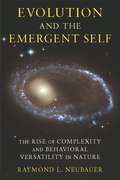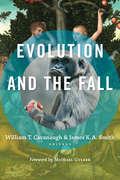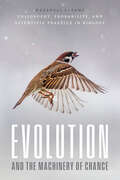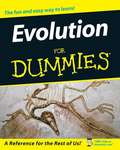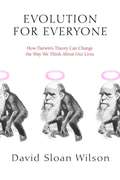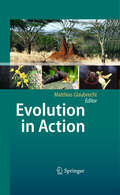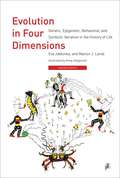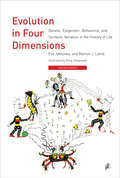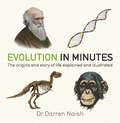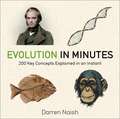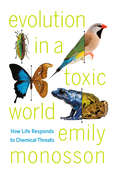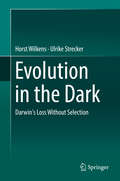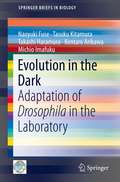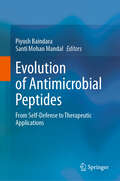- Table View
- List View
Evolution and the Emergent Self: The Rise of Complexity and Behavioral Versatility in Nature
by Raymond L. NeubauerRaymond L. Neubauer presents a view of nature that describes rising complexity in life in terms of increasing information content, first in genes and then in brains. The evolution of the nervous system expanded the capacity to store information with relatively open-ended programs, making learning possible. Portraying four species with high brain-to-body ratios&mdashchimpanzees, elephants, ravens, and dolphins&mdashNeubauer shows how each shares with humans the capability for complex communication, social relationships, flexible behavior, tool use, and powers of abstraction. He describes this constellation of qualities as an emergent self, arguing that humanity is not the only self-aware species and that human characteristics are embedded in the evolutionary process and are emerging in a variety of lineages on our planet. Neubauer ultimately shows that human culture is not a unique offshoot of a language-specialized primate, but an extension of a fundamental strategy that organisms have used since the beginning of life on earth to gather information and buffer themselves from environmental fluctuations. Neubauer also views these processes in a cosmic setting, detailing open thermodynamic systems that become more complex as the energy flowing through them increases. Similar processes of increasing complexity can be found in "self-organizing" structures in both living and non-living forms. Recent evidence from astronomy indicates that planet formation may be nearly as frequent as star formation. In February 2011, NASA announced that the Kepler space telescope had located fifty-four planets in the habitable zones around their stars. Life makes use of the elements most commonly seeded into space by burning and exploding stars, and the evolution of life and intelligence that occurred on our planet may be common across the universe.
Evolution and the Emergent Self: The Rise of Complexity and Behavioral Versatility in Nature
by Raymond NeubauerEvolution and the Emergent Self is an eloquent and evocative new synthesis that explores how the human species emerged from the cosmic dust. Lucidly presenting ideas about the rise of complexity in our genetic, neuronal, ecological, and ultimately cosmological settings, the author takes readers on a provocative tour of modern science's quest to understand our place in nature and in our universe. Readers fascinated with "Big History" and drawn to examine big ideas will be challenged and enthralled by Raymond L. Neubauer's ambitious narrative.How did humans emerge from the cosmos and the pre-biotic Earth, and what mechanisms of biological, chemical, and physical sciences drove this increasingly complex process? Neubauer presents a view of nature that describes the rising complexity of life in terms of increasing information content, first in genes and then in brains. The evolution of the nervous system expanded the capacity of organisms to store information, making learning possible. In key chapters, the author portrays four species with high brain:body ratios—chimpanzees, elephants, ravens, and dolphins—showing how each species shares with humans the capacity for complex communication, elaborate social relationships, flexible behavior, tool use, and powers of abstraction. A large brain can have a hierarchical arrangement of circuits that facilitates higher levels of abstraction.Neubauer describes this constellation of qualities as an emergent self, arguing that self-awareness is nascent in several species besides humans and that potential human characteristics are embedded in the evolutionary process and have emerged repeatedly in a variety of lineages on our planet. He ultimately demonstrates that human culture is not a unique offshoot of a language-specialized primate, but an analogue of fundamental mechanisms that organisms have used since the beginning of life on Earth to gather and process information in order to buffer themselves from fluctuations in the environment.Neubauer also views these developments in a cosmic setting, detailing open thermodynamic systems that grow more complex as the energy flowing through them increases. Similar processes of increasing complexity can be found in the "self-organizing" structures of both living and nonliving forms. Recent evidence from astronomy indicates that planet formation may be nearly as frequent as star formation. Since life makes use of the elements commonly seeded into space by burning and expiring stars, it is reasonable to speculate that the evolution of life and intelligence that happened on our planet may be found across the universe.
Evolution and the Fall
by William T. Cavanaugh James K. Smith Michael GulkerWhat does it mean for the Christian doctrine of the Fall if there was no historical Adam? If humanity emerged from nonhuman primates—as genetic, biological, and archaeological evidence seems to suggest—then what are the implications for a Christian understanding of human origins, including the origin of sin?Evolution and the Fall gathers a multidisciplinary, ecumenical team of scholars to address these difficult questions and others like them from the perspectives of biology, theology, history, Scripture, philosophy, and politicsCONTRIBUTORS: William T. Cavanaugh Celia Deane-Drummond Darrel R. Falk Joel B. Green Michael Gulker Peter Harrison J. Richard Middleton Aaron Riches James K. A. Smith Brent Waters Norman Wirzba
Evolution and the Machinery of Chance: Philosophy, Probability, and Scientific Practice in Biology
by Marshall AbramsAn innovative view of the role of fitness concepts in evolutionary theory. Natural selection is one of the factors responsible for changes in biological populations. Some traits or organisms are fitter than others, and natural selection occurs when there are changes in the distribution of traits in populations because of fitness differences. Many philosophers of biology insist that a trait’s fitness should be defined as an average of the fitnesses of individual members of the population that have the trait. Marshall Abrams argues convincingly against this widespread approach. As he shows, it conflicts with the roles that fitness is supposed to play in evolutionary theory and with the ways that evolutionary biologists use fitness concepts in empirical research. The assumption that a causal kind of fitness is fundamentally a property of actual individuals has resulted in unnecessary philosophical puzzles and years of debate. Abrams came to see that the fitnesses of traits that are the basis of natural selection cannot be defined in terms of the fitnesses of actual members of populations, as philosophers of biology often claim. Rather, it is an overall population-environment system—not actual, particular organisms living in particular environmental conditions—that is the basis of trait fitnesses. Abrams argues that by distinguishing different classes of fitness concepts and the roles they play in the practice of evolutionary biology, we can see that evolutionary biologists’ diverse uses of fitness concepts make sense together and are consistent with the idea that fitness differences cause evolution. Abrams’s insight has broad significance, for it provides a general framework for thinking about the metaphysics of biological evolution and its relations to empirical research. As such, it is a game-changing book for philosophers of biology, biologists who want deeper insight into the nature of evolution, and anyone interested in the applied philosophy of probability.
Evolution as a Religion: Strange Hopes and Stranger Fears
by Mary MidgleyThis book examines how science comes to be used as a substitute for religion and points out how badly that role distorts it. Her argument is flawlessly insightful: a punch, compelling, lively indictment of these misuses of science. Both the book and its author are true classics of our time.
Evolution by Natural Selection: Confidence, Evidence and the Gap (Species and Systematics)
by Michaelis MichaelA persistent argument among evolutionary biologists and philosophers revolves around the nature of natural selection. Evolution by Natural Selection: Confidence, Evidence and the Gap explores this argument by using a theory of persistence as an intentional foil to examine ways in which similar theories can be misunderstood. It discusses Charles Dar
Evolution for Dummies
by Greg Krukonis Tracy BarrToday, most colleges and universities offer evolutionary study as part of their biology curriculums. Evolution For Dummies will track a class in which evolution is taught and give an objective scientific view of the subject. This balanced guide explores the history and future of evolution, explaining the concepts and science behind it, offering case studies that support it, and comparing evolution with rival theories of creation, such as intelligent design. It also will identify the signs of evolution in the world around us and explain how this theory affects our everyday lives and the future to come. Greg Krukonis, PhD (Portland, OR) received his doctorate from the University of Arizona Department of Ecology and Evolutionary Biology. He is a former assistant adjunct professor at Lewis and Clark College, where he taught evolution.
Evolution for Everyone: How Darwin's Theory Can Change the Way We Think About Our Lives
by David Sloan WilsonWhat is the biological reason for gossip? For laughter? For the creation of art? Why do dogs have curly tails? What can microbes tell us about morality? These and many other questions are tackled by renowned evolutionist David Sloan Wilson in this witty and groundbreaking new book. With stories that entertain as much as they inform, Wilson outlines the basic principles of evolution and shows how, properly understood, they can illuminate the length and breadth of creation, from the origin of life to the...
Evolution from a Thermodynamic Perspective: Implications for Species Conservation and Agricultural Sustainability
by Carl F JordanSurvival of the fittest” is a tautology, because those that are “fit” are the ones that survive, but to survive, a species must be “fit”. Modern evolutionary theory avoids the problem by defining fitness as reproductive success, but the complexity of life that we see today could not have evolved based on selection that favors only reproductive ability. There is nothing inherent in reproductive success alone that could result in higher forms of life. Evolution from a Thermodynamic Perspective presents a non-circular definition of fitness and a thermodynamic definition of evolution. Fitness means maximization of power output, necessary to survive in a competitive world. Evolution is the “storage of entropy”. “Entropy storage” means that solar energy, instead of dissipating as heat in the Earth, is stored in the structure of living organisms and ecosystems. Part one explains this in terms comprehensible to a scientific audience beyond biophysicists and ecosystem modelers. Part two applies thermodynamic theory in non-esoteric language to sustainability of agriculture, and to conservation of endangered species. While natural systems are stabilized by feedback, agricultural systems remain in a mode of perpetual growth, pressured by balance of trade and by a swelling population. The constraints imposed by thermodynamic laws are being increasingly felt as economic expansion destabilizes resource systems on which expansion depends.
Evolution from the Galapagos: Two Centuries after Darwin
by Carlos Montúfar Gabriel TruebaThis volume is a collection of the some of the most significant lectures that well-known experts presented at our two international "summits on evolution" (2005, 2009) as updated and revised chapters. The meetings took place on one of the large islands of the Galapagos archipelago (San Cristobal) at GAIAS (Galapagos Institute for the Arts and Sciences) of the Universidad San Francisco de Quito (USFQ), Ecuador. The main goal of the two Galapagos Summits on Evolution has been to bring together scientists and graduate students engaged in the study of evolution, from life's origin to its current diversity. Because of their historical significance, the Galapagos are a unique venue for promoting comprehensive research on evolution and ecology and to make the research results available to students and teachers everywhere, but especially from developing countries. As shown by the enthusiastic attendance at both summits and the many suggestions to keep them continuing, the meetings have opened new opportunities for students from Ecuador and other Latin American countries to be inspired by some of the most brilliant minds in evolutionary science.
Evolution für Dummies (Für Dummies)
by Greg Krukonis Tracy L. BarrVon Darwin bis DNA – Ihr Wegweiser durch die Evolution Von Ihrem Körperbau bis zu Ihrem Verhalten bei der Partnerwahl – all Ihre vererbbaren Eigenschaften sind wie bei allen Lebewesen durch die Evolution bestimmt. Aber was ist Evolution überhaupt? Was treibt sie an? In diesem Buch erfahren Sie alles, was Sie über Evolution wissen müssen: Was genetische Variabilität ist, wie neue Arten entstehen, welchen Evolutionsvorteil soziales Verhalten bringt und vieles, vieles mehr. Greg Krukonis und Tracy Barr nehmen Sie mit auf eine spannende Reise durch die Geschichte der Evolution – von Darwins Theorie bis zu den neuesten wissenschaftlichen Erkenntnissen.
Evolution in Action
by Matthias GlaubrechtWe have come a long way towards better understanding how new species originate, i.e. speciation, which long remained Darwin's "mystery of mysteries." Since speciation is the underlying mechanism for radiations, it is the ultimate causation for the biological diversity of life that surrounds us. Without a doubt, Charles Darwin's contribution to our understanding of the origin of biodiversity cannot be overestimated. This book is a contribution to both the Darwin Year we celebrated in 2009 and to the Year of Biodiversity and Conservation 2010. The studies and model cases presented show the progress and dynamics of research based on Darwinian theories and sheds light on its implications in the context of current biodiversity crises. The great importance of adaptive (and non-adaptive) radiations for biodiversity is widely accepted, but our understanding of the processes and mechanisms involved is still limited and generalizations need to be based on the accumulation of more evidence from additional case studies. The studies presented in this volume are those urgently needed and focus on a variety of organisms and different aspects of radiations. The scientific results presented therein are excellent examples not only of evolution in action, but also of active research on evolutionary processes and their most apparent outcome - biodiversity.
Evolution in Four Dimensions
by Eva Jablonka Anna Zeligowski Marion J. LambThis new edition of the widely read Evolution in Four Dimensions has been revised to reflect the spate of new discoveries in biology since the book was first published in 2005, offering corrections, an updated bibliography, and a substantial new chapter. Eva Jablonka and Marion Lamb's pioneering argument proposes that there is more to heredity than genes. They describe four "dimensions" in heredity -- four inheritance systems that play a role in evolution: genetic, epigenetic (or non-DNA cellular transmission of traits), behavioral, and symbolic (transmission through language and other forms of symbolic communication). These systems, they argue, can all provide variations on which natural selection can act. Jablonka and Lamb present a richer, more complex view of evolution than that offered by the gene-based Modern Synthesis, arguing that induced and acquired changes also play a role. Their lucid and accessible text is accompanied by artist-physician Anna Zeligowski's lively drawings, which humorously and effectively illustrate the authors' points. Each chapter ends with a dialogue in which the authors refine their arguments against the vigorous skepticism of the fictional "I.M." (for Ipcha Mistabra -- Aramaic for "the opposite conjecture"). The extensive new chapter, presented engagingly as a dialogue with I.M., updates the information on each of the four dimensions -- with special attention to the epigenetic, where there has been an explosion of new research. Praise for the first edition"With courage and verve, and in a style accessible to general readers, Jablonka and Lamb lay out some of the exciting new pathways of Darwinian evolution that have been uncovered by contemporary research." -- Evelyn Fox Keller, MIT, author of Making Sense of Life: Explaining Biological Development with Models, Metaphors, and Machines"In their beautifully written and impressively argued new book, Jablonka and Lamb show that the evidence from more than fifty years of molecular, behavioral and linguistic studies forces us to reevaluate our inherited understanding of evolution." -- Oren Harman, The New Republic"It is not only an enjoyable read, replete with ideas and facts of interest but it does the most valuable thing a book can do -- it makes you think and reexamine your premises and long-held conclusions." -- Adam Wilkins, BioEssays
Evolution in Four Dimensions, revised edition: Genetic, Epigenetic, Behavioral, and Symbolic Variation in the History of Life (Life and Mind: Philosophical Issues in Biology and Psychology)
by Eva Jablonka Marion J. LambA pioneering proposal for a pluralistic extension of evolutionary theory, now updated to reflect the most recent research. This new edition of the widely read Evolution in Four Dimensions has been revised to reflect the spate of new discoveries in biology since the book was first published in 2005, offering corrections, an updated bibliography, and a substantial new chapter. Eva Jablonka and Marion Lamb's pioneering argument proposes that there is more to heredity than genes. They describe four “dimensions” in heredity—four inheritance systems that play a role in evolution: genetic, epigenetic (or non-DNA cellular transmission of traits), behavioral, and symbolic (transmission through language and other forms of symbolic communication). These systems, they argue, can all provide variations on which natural selection can act. Jablonka and Lamb present a richer, more complex view of evolution than that offered by the gene-based Modern Synthesis, arguing that induced and acquired changes also play a role. Their lucid and accessible text is accompanied by artist-physician Anna Zeligowski's lively drawings, which humorously and effectively illustrate the authors' points. Each chapter ends with a dialogue in which the authors refine their arguments against the vigorous skepticism of the fictional “I.M.” (for Ipcha Mistabra—Aramaic for “the opposite conjecture”). The extensive new chapter, presented engagingly as a dialogue with I.M., updates the information on each of the four dimensions—with special attention to the epigenetic, where there has been an explosion of new research. Praise for the first edition“With courage and verve, and in a style accessible to general readers, Jablonka and Lamb lay out some of the exciting new pathways of Darwinian evolution that have been uncovered by contemporary research.”—Evelyn Fox Keller, MIT, author of Making Sense of Life: Explaining Biological Development with Models, Metaphors, and Machines“In their beautifully written and impressively argued new book, Jablonka and Lamb show that the evidence from more than fifty years of molecular, behavioral and linguistic studies forces us to reevaluate our inherited understanding of evolution.”—Oren Harman, The New Republic“It is not only an enjoyable read, replete with ideas and facts of interest but it does the most valuable thing a book can do—it makes you think and reexamine your premises and long-held conclusions.”—Adam Wilkins, BioEssays
Evolution in Isolation: The Search for an Island Syndrome in Plants
by Kevin C. BurnsOceanic islands are storehouses for unique creatures. Zoologists have long been fascinated by island animals because they break all the rules. Speedy, nervous, little birds repeatedly evolve to become plump, tame and flightless on islands. Equally strange and wonderful plants have evolved on islands. However, plants are very poorly understood relatives to animals. Do plants repeatedly evolve similar patterns in dispersal ability, size and defence on islands? This volume answers this question for the first time using a modern quantitative approach. It not only reviews the literature on differences in defence, loss of dispersal, changes in size, alterations to breeding systems and the loss of fire adaptations, but also brings new data into focus to fill gaps in current understanding. By firmly establishing what is currently known about repeated patterns in the evolution of island plants, this book provides a roadmap for future research.
Evolution in Minutes (IN MINUTES)
by Darren NaishHow did life begin? What is the theory of evolution and is it proven? Are we really descended from apes? And has evolution stalled or is humanity just a step on the way to more advanced forms of life?Through 200 mini-essays, expert palaeontologist Darren Naish answers these and many other fundamental questions on the most controversial topic of all. From the theories of Charles Darwin and the Survival of the Fittest to cutting-edge research on consciousness and artificial life, he explains where we came from, how we became human, and what might happen to us next. Immense in scope, and with 200 informative images and diagrams, Evolution in Minutes concisely covers the concepts, rival theories, history and politics of evolution, as well as explaining the development of life across deep time as revealed by the fossil record, from the earliest bacteria via dinosaurs and Neanderthals to humankind - and beyond.
Evolution in Minutes (In Minutes)
by Darren NaishEvolution in Minutes is your compact and accessible guide to the central concepts of the science of evolution, revealing how biological populations change over successive generations. Covering the basics of speciation, genesis, and extinction in animals, plants, and humans alike--from the origins and development of life to artificial selection and evolutionary algorithms--this is the fastest, fullest path to understanding evolution. Contents include fossils, microbes, genes, DNA, natural selection, Darwinism, genetic drift, mutation, gene migration, heredity, adaptation, and variation, as well as key biological concepts necessary to understand the fascinating field of evolution.
Evolution in a Toxic World
by Emily MonossonWith BPA in baby bottles, mercury in fish, and lead in computer monitors, the world has become a toxic place. But as Emily Monosson demonstrates in her groundbreaking new book, it has always been toxic. When oxygen first developed in Earth's atmosphere, it threatened the very existence of life: now we literally can't live without it. According to Monosson, examining how life adapted to such early threats can teach us a great deal about today's (and tomorrow's) most dangerous contaminants. While the study of evolution has advanced many other fields of science, from biology to medicine, toxicology has yet to embrace this critical approach. In Evolution in a Toxic World, Monosson seeks to change that.
Evolution in the Dark
by Horst Wilkens Ulrike StreckerThis book provides fascinating insights into the development and genetics of evolutionary processes on the basis of animals living in the dark, such as the Astyanax cave fish. Biologically functionless traits show high variability, which results from neutral deleterious mutations no longer being eliminated by natural selection, which normally acts to preserve functional capability. These negative mutations accumulate until the traits they are responsible for become rudimentary or even lost. The random genetic basis of regressive evolution is in accordance with Nei's Neutral Theory of Molecular Evolution, which applies to the molecular level. Such processes are particularly conspicuous in species living in constant darkness, where, for example in Astyanax, all traits depending on the exposure to light, like eyes, pigmentation, visually triggered aggressive behaviour, negative phototaxis, and several peripheral outcomes of circadian rhythmicity, are useless and diminish. In compensation constructive traits like taste, olfaction or the lateral line senses are improved by selection and do not show variability. Regressive and constructive traits inherit independently, proving that the rudimentation process is not driven by pleiotropic linkage between them. All these traits are subject to mosaic evolution and exhibit unproportional epistatic gene effects, which play an important role in evolutionary adaptation and improvement. Offering valuable evolutionary insights and supplemented by a wealth of illustrations, this book will appeal to evolutionary and developmental biologists alike.
Evolution in the Dark
by Naoyuki Fuse Tasuku Kitamura Takashi Haramura Kentaro Arikawa Michio ImafukuHow organisms come to possess adaptive traits is a fundamental question for evolutionary biology. Although it is almost impossible to demonstrate evolution in the laboratory, this issue can be approached by using an unusual organism, "Dark-fly": Drosophila melanogaster kept in complete darkness for 57 years through 1,400 generations, which corresponds to 28,000 years in terms of human generations. Has Dark-fly adapted to an environment of total darkness? If so, what is the molecular nature of the adaptation? In Evolution in the Dark, the remarkable findings from the Dark-fly project performed at Kyoto University are presented. It was found that Dark-fly did not have poor eyesight, but rather exhibited higher phototaxis ability and displayed lengthened bristles on the head that function as tactile receptors. Circadian rhythms were weakened but still retained in Dark-fly. With recent progress in genome science enabling researchers to perform whole genome sequencing for Dark-fly, a large number of mutations were identified including genes encoding a light receptor, olfactory receptors, and enzymes involved in neural development. The Dark-fly project is a simple but very long-term experiment. Combined with advanced techniques in genetics and genomics, it is a valuable tool for understanding the molecular nature of adaptive evolution.
Evolution of Antimicrobial Peptides: From Self-Defense to Therapeutic Applications
by Piyush Baindara Santi Mohan MandalOver the last century, antibiotics have been a primary treatment for infectious diseases, and indiscriminate use by both healthcare providers and patients has led to the rapid emergence of resistant pathogens. Multidrug-resistant pathogens and infective agents are an urgent threat to global health, and this issue has created a critical need for the investigation of alternatives to conventional antibiotics. Antimicrobial peptides (AMPs) have emerged as promising alternative therapeutics, with studies on their mechanisms and applications an area of intense interest in agricultural science, physiology, and medicine. AMPS are naturally occurring components of the host defense system, and functional throughout all orders of life, from prokaryotes to eukaryotes. They are potent molecules with broad spectrum activities against infectious agents, including bacteria, fungi, viruses, and parasites. AMPs have demonstrated therapeutic potential against non-infectious diseases like chronic inflammation and cancer, and have been found to have potential activities against slow-growing bacteria, such as biofilms. This book summarizes the current available research on AMPs, including discovery, screening, and characterization, for therapeutic applications. It discusses molecular biology, proteomics, genomics, and bioinformatics approaches. In addition, it covers AMP classification and evolutionary studies, from prokaryotes to eukaryotes.
Evolution of Bioenergetics from Elements to Life: Emergence of High Energy Mitochondria
by David F. StoweThis book begins with the creation of the elements used in life and how these elements, as atoms, bound together into organic compounds and polymerized into lipids, peptides, and nucleotides. The text stresses the role and importance of the elements C, H, O, N, P, S, the univalent and multivalent ions, and the requirement of liquid water to foster prebiotic life. Expert author Dr. David Stowe explains the role of early molecular interactions in developing the first living prokaryote bacteria and their eventual engulfment as organelles to make eukaryotes that allowed their sophistication into specialized cells and large multicellular organisms. The book uniquely traces the genesis of bioenergetics and uses cardiac cell mitochondia as an evolutionary example for modern bioenergetic function. This book is geared toward graduate students, post-doctoral fellows, and other academics interested in evolutionary biochemistry with an emphasis on the early development of bioenergetics leading to modern, high energy mitochondria.
Evolution of Black Holes in Anti-de Sitter Spacetime and the Firewall Controversy
by Yen Chin OngThis thesis focuses on the recent firewall controversy surrounding evaporating black holes, and shows that in the best understood example concerning electrically charged black holes with a flat event horizon in anti-de Sitter (AdS) spacetime, the firewall does not arise. The firewall, which surrounds a sufficiently old black hole, threatens to develop into a huge crisis since it could occur even when spacetime curvature is small, which contradicts general relativity. However, the end state for asymptotically flat black holes is ill-understood since their curvature becomes unbounded. This issue is avoided by working with flat charged black holes in AdS. The presence of electrical charge is crucial since black holes inevitably pick up charges throughout their long lifetime. These black holes always evolve toward extremal limit, and are then destroyed by quantum gravitational effects. This happens sooner than the time required to decode Hawking radiation so that the firewall never sets in, as conjectured by Harlow and Hayden. Motivated by the information loss paradox, the author also investigates the possibility that "monster" configurations might exist, with an arbitrarily large interior bounded by a finite surface area. Investigating such an object in AdS shows that in the best understood case, such an object -- much like a firewall -- cannot exist.
Evolution of Cenozoic Land Mammal Faunas and Ecosystems: 25 Years of the NOW Database of Fossil Mammals (Vertebrate Paleobiology and Paleoanthropology)
by Christine M. Janis Isaac Casanovas-Vilar Lars W. van den Hoek Ostende Juha SaarinenThis volume presents an array of different case studies which take as primary material data sourced from the NOW (‘New and Old Worlds’) database of fossil mammals. The NOW database was one of the very first large paleobiological databases, and since 1996 it has been expanded from including mainly Neogene European land mammals to cover the entire Cenozoic at a global scale. In the last two decades the number of works that are based in the use of huge databases to explore ecological and evolutionary questions has increased exponentially, and even though the importance of big data in paleobiological research has been outlined in selected chapters of general works, no volume has appeared before this one which solely focuses on the databases as a primary source in reconstructing the past. The purpose of this book is to provide an illustrative volume showing the importance of big data in paleobiological research, and presenting a broad array of unpublished examples and case studies. The book is mainly aimed to professional palaeobiologists working with Cenozoic land mammals, but the scope of the book is broad enough to fit the interest for evolutionary biologists, paleoclimatologists and paleoecologists.The volume is divided in four parts. The first part includes two chapters on the development of large paleobiological databases, providing a first-hand account on the logic and the functioning of these databases. This is a much-needed perspective which is ignored by most researchers and users of such databases and, even if centered in the NOW database, the lessons that can be learned from this part can be extended to other examples. After this introductory part, the body of the book follows and is divided into three parts: patterns in regional faunas; large scale patterns and processes; and ecological, biogeographical and evolutionary patterns of key taxa. Each chapter is written by well-known specialists in the field, with some participation of members of the NOW advisory board. The array of selected mammal taxa ranges from carnivores, equids, ruminants and rodents to the genus Homo. The topics studied also include the diversification and radiation of major clades, large-scale paleobiogeographical patterns, the evolution of ecomorphological patterns and paleobiological problems such as evolution of body size or species longevity. In most cases the results are discussed in relation to protracted environmental or paleogeographic changes.
Evolution of Extracellular Matrix
by Robert Mecham Fred W. KeeleyThe evolution of single cells into multicellular organisms was mediated, in large part, by the extracellular matrix. The proteins and glycoconjugates that make up the extracellular matrix provide structural support to cellular complexes, facilitate cell adhesion and migration, and impart mechanical properties that are important for tissue function. Each class of ECM macromolecule has evolved to incorporate distinctive properties that are defined by conserved modules that are mixed together to achieve appropriate function. This volume provides a comprehensive analysis of how the major ECM components evolved over time in order to fill their specific roles found in modern organisms. The major focus is on the structural matrix proteins, matricellular proteins, and more complex ECM structures such as basement membranes. Adhesive proteins and their receptors are also discussed.
